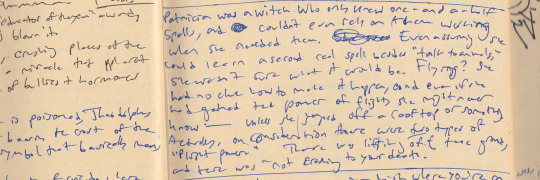Writing a novel longhand is a terrible idea, but it’s the only way I know

I’ve written like six and a half novels at this point and pretty much all of them started out as scribbles in notebooks. I have piles and piles of journals that are full of semi-illegible scrawls that I later had to type into a computer and clean up and then revise several times. There was a point back in early 2012 when I had a stack of notebooks containing a ton of material for All the Birds in the Sky, and I hadn’t transcribed them or anything yet. I was trying to describe my book in progress to someone at a con, and mentioned that it was all just in longhand. And if anything happened while I was traveling, that novel was gone – no way I could possibly reconstruct it or rewrite it from scratch. It was kind of a scary thought.
The sucky thing about writing books longhand is that you always end up with discontinuities, or things where you changed your mind halfway thru, and now things don’t match up. And it’s maybe even messier than a regular first draft. Plus the whole business of having to type it in to the computer always takes wayyyy longer than you think it will.
But it’s the only way I seem to be able to do a novel. Because writing with pen and ink makes it harder to keep going back and editing what I already wrote, and it feels more like writing in my personal journal and just writing down what I feel, without any big filter. You can maybe get more rawness that way. I just don’t self-censor as much with a pen and paper. And then the part where I have to type it all in is where I wind up making tweaks and fixes as I go, and it’s also a good way to start rethinking this godawful mess I’ve created and what I can do to make it work. The weird part is when I look back at those notebooks and there’s the occasional passage that made it into the final book more or less verbatim.



